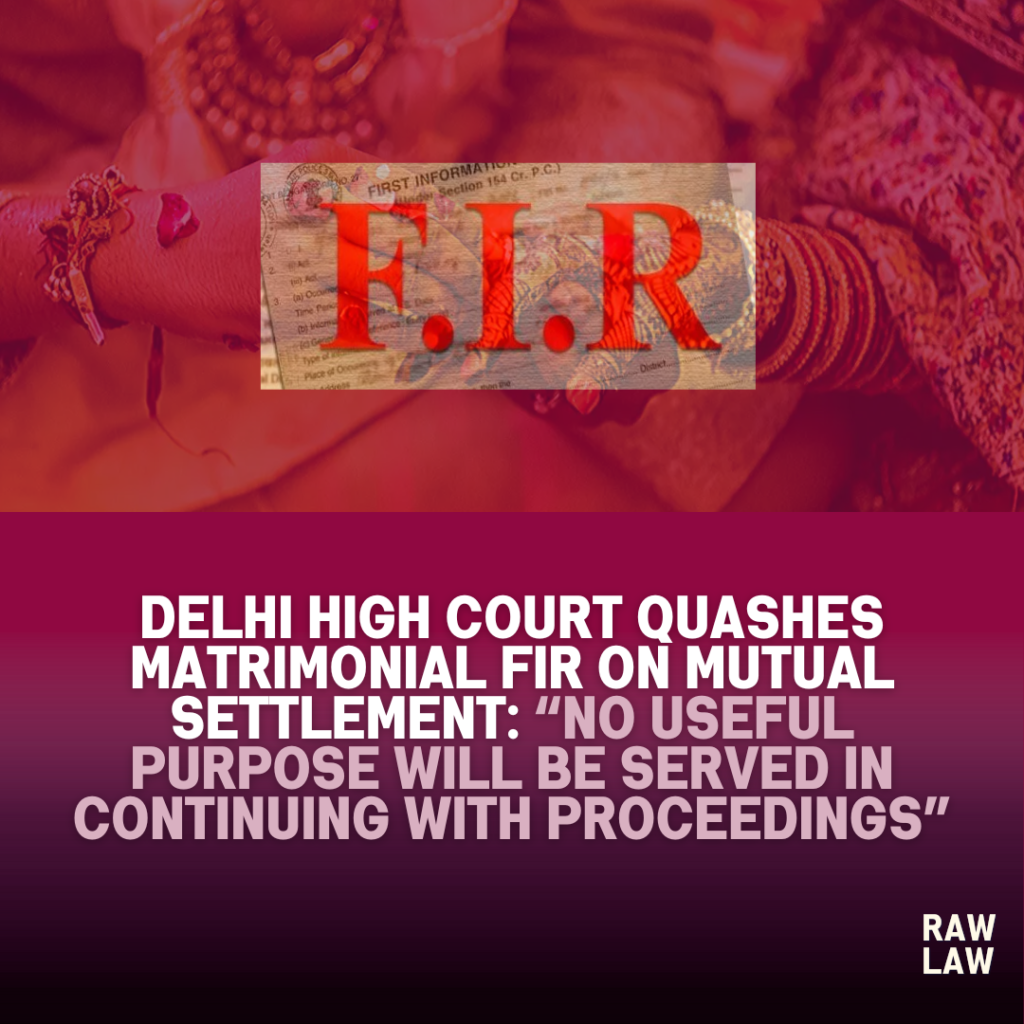Court’s Decision
The Delhi High Court, in a matrimonial dispute under Sections 498A/406/34 of the Indian Penal Code, exercised its jurisdiction under Section 528 of the Bharatiya Nagarik Suraksha Sanhita, 2023 to quash the FIR, chargesheet, and all consequential proceedings. The Court acknowledged that the parties had amicably resolved their disputes, including executing a formal divorce and settlement deed. It held that continuing criminal proceedings in such a case would be a futile exercise and contrary to the interest of justice.
“No useful purpose will be served in continuing with the present FIR… in view of the settlement between the parties.”
Facts
The petitioner and respondent had solemnized their marriage on 26 August 2012 as per Muslim rites and ceremonies. A male child was born from the marriage on 7 May 2013. However, owing to temperamental differences, the couple separated in November 2016. Following the separation, the respondent-wife filed a complaint under Section 12 of the Protection of Women from Domestic Violence Act, 2005 and also lodged an FIR against the husband and his family under Sections 498A, 406, and 34 of the Indian Penal Code. A chargesheet was subsequently filed by the police.
In due course of time, the parties resolved their disputes amicably. They executed a deed of divorce (talaq-e-ahsan) on 11 August 2024 and a comprehensive settlement deed on 24 January 2025. The terms of settlement included withdrawal of all pending complaints and litigations between them.
Issues
Whether the FIR registered under Sections 498A/406/34 IPC and the criminal proceedings emanating therefrom should be quashed under Section 528 of the Bharatiya Nagarik Suraksha Sanhita, 2023, in light of the settlement reached between the parties?
Petitioner’s Arguments
The petitioners submitted that they had reached an amicable settlement with the complainant (respondent No.2). They informed the Court that all disputes stood resolved through a mutual agreement executed on 24 January 2025. A deed of divorce had already been executed and the complainant had agreed to resume cohabitation with the petitioner voluntarily, without any coercion. In light of this development, the petitioners requested the Court to quash the FIR and all proceedings arising from it.
Respondent’s Arguments
The respondent-wife appeared in person and confirmed the settlement. She unequivocally stated that she had entered into the agreement of her own free will, without any pressure or compulsion. She also expressed her willingness to resume cohabitation with the petitioner and conveyed her explicit consent to the quashing of the FIR. The Additional Public Prosecutor, appearing for the State, did not raise any objection to the prayer for quashing, given the mutually agreed settlement and the absence of any continuing grievance.
Analysis of the Law
The Court considered the powers conferred under Section 528 of the Bharatiya Nagarik Suraksha Sanhita, 2023, which is analogous to Section 482 of the Code of Criminal Procedure, 1973. This provision empowers the High Court to exercise its inherent jurisdiction to prevent abuse of process of law and to secure the ends of justice. The Court emphasized that criminal proceedings arising out of matrimonial discord—when subsequently resolved—ought not to be perpetuated unnecessarily.
Precedent Analysis
The Court relied on the Supreme Court’s decision in Gian Singh v. State of Punjab, (2012) 10 SCC 303, where it was observed:
“The High Court must consider whether it would be unfair or contrary to the interest of justice to continue with the criminal proceedings… and whether to secure the ends of justice, it is appropriate that the criminal case is put to an end…”
Applying this principle, the Court concluded that no purpose would be served in continuing the proceedings when the complainant herself wished to put the matter to rest.
Court’s Reasoning
The Court found that the parties had taken all necessary steps to resolve the dispute amicably. The divorce had been executed voluntarily, the settlement deed was on record, and both parties were physically present in Court to confirm the agreement. The Investigating Officers and counsel also identified the parties, and no coercion was alleged.
The Court noted that prolonging such litigation, where the victim has moved on and supports the quashing of the FIR, would only serve to waste judicial time and further burden the criminal justice system.
Conclusion
The High Court allowed the petition. FIR No. 0125/2017, dated 12 April 2017, registered at P.S. Sarai Rohilla, along with the chargesheet and all consequential proceedings, was quashed. The petition and all pending applications stood disposed of.
Implications
This judgment reiterates that the High Court has the power to quash criminal proceedings arising out of matrimonial disputes, provided the parties have amicably resolved the matter and continuation would serve no meaningful purpose. The decision underlines the judiciary’s focus on promoting peaceful resolution in family matters and reducing the burden of unnecessary criminal trials.
Cases Referred
- Gian Singh v. State of Punjab, (2012) 10 SCC 303: The Court relied heavily on this landmark judgment which affirms the power of the High Court to quash criminal proceedings in cases of settlement, especially where the offence is private in nature and does not impact public interest.
FAQs
1. Can FIRs under matrimonial laws be quashed by the High Court if the couple reconciles?
Yes. The High Court can exercise inherent powers under Section 528 BNSS (formerly Section 482 CrPC) to quash FIRs when the parties have amicably settled their disputes, particularly in matrimonial cases.
2. Does the complainant need to appear in court for the FIR to be quashed?
Yes. The complainant must appear and confirm before the court that the settlement was voluntary and that they have no objection to quashing the FIR.
3. Is the presence of Investigating Officers necessary during such quashing proceedings?
While not always mandatory, the presence and identification of parties by the Investigating Officers, as done in this case, ensures due process and authenticity of the settlement.



